A traumatic brain injury (TBI) can dramatically alter the course of a person’s life. A blunt force trauma to the head can often interrupt normal brain functions. A sudden blow or jolt to the head can cause traumatic brain injuries that affect one’s quality of life in several ways.
With symptoms that are broad-ranging and severe, this type of injury may render a person unable to earn a living. When this is true, accident victims may be eligible for disability benefits through the Social Security Disability Insurance (SSDI) program or the Supplemental Security Income (SSI) program. Keep reading to find out more.
8 Symptoms of Traumatic Brain Injury
- Memory Loss
- Confusion
- Headache
- Dizziness or Other Sensory Issues
- Seizures
- Speech Difficulties
- Trouble Sleeping
- Mood Changes or Extreme Mood Swings
Is Traumatic Brain Injury a Disability?
Sometimes, yes. The Social Security Administration will be thorough in its five-step evaluation of your application before approving a disability claim. This is the same process the SSA uses to assess any claim – for back pain disability, depression disability, migraine disability, or any other claim for a medical condition that makes it impossible to get a job.
Some symptoms associated with traumatic brain injury are mild and short-lived, only temporarily affecting the brain cells. Other injuries can be much more severe, involving torn tissue, bleeding, bruising, and other physical damage to the brain. These types of symptoms may be permanent and are the kinds of symptoms that can prevent someone from being able to earn a living through gainful employment. Symptoms of severe brain injury may appear right after an accident, while others may not show up for days or weeks afterward.
In general, brain injuries are classified as either mild, moderate, or severe. But even a mild injury to the brain is a serious injury that merits quick medical attention and an accurate diagnosis and treatment plan. People suffer traumatic brain injuries as a result of a wide variety of accidents, including falls, car accidents, gunshot wounds, violence or abuse, athletic accidents, explosive blasts, and more. Falls are the leading cause of severe brain injury or cerebral trauma.
In addition to classifying your medical disability, the SSA will first need to determine whether you meet income eligibility requirements for Social Security disability benefits. This is the non-medical step of the evaluation process. To qualify for benefits, your documented earnings must not exceed program thresholds.
Both SSDI and SSI have specific income requirements for those who participate in those programs. To qualify for SSDI benefits, you must have previously worked and accumulated enough work credits to meet qualification criteria.
Determining the severity of an injury is the second step in the SSA process. For a successful brain injury disability claim, you will need to show appropriate medical documentation that your TBI is severe enough to limit or prohibit your ability to do your job.
SSA reviewers will need to see evidence that your residual functional capacity is low enough to prevent you from working. This is where a trusted disability attorney can be extremely helpful. A lawyer can assess the strength of your claim from the start, advise as to appropriate medical evidence of your impairment, and even help with the appeal process if that becomes necessary.
When the SSA moves to the third stage of its evaluation process, it will check to see whether any of your reported symptoms match up with its blue book manual of disabling conditions. If so, you may automatically be approved for disability compensation without moving further through the process.
Common blue book listings associated with traumatic brain injury include convulsive epilepsy, non-convulsive epilepsy, stroke or stroke-like complications, and organic mental disorders. If your TBI does not align with one of these listings, it’s worth talking with a knowledgeable disability lawyer about the strength of your claim. The SSA will consider your claim in its totality, so even if it doesn’t easily align with a blue book listing, you may still be approved. It’s always a good idea to apply and find out for sure.
As your claim moves to the fourth stage, SSA reviewers will examine whether you retain the ability to complete the type of work you used to do. The SSA will evaluate your residual functional capacity and determine how able you are to perform work-related tasks like sitting, standing, lifting, pushing, pulling, crouching, remembering, and understanding.
Reviewers will also consider any type of work you’ve done over the last 15 years before you were injured. A reviewer will then determine whether your physical and mental state allows you to perform the job duties associated with any of your prior work. If the answer is yes, it is unlikely that the SSA will approve your claim for SSDI benefits.
In the final step, the SSA will determine if you can complete the duties associated with any other type of work. In other words, do you have transferable skills that could be used in another line of work that would allow you to find gainful employment? In this step, the SSA will consider the same criteria as in stage four, while also considering your age and education level.
If the SSA determines that there are some types of work you are able to complete, then your claim is likely to be denied at this final stage. But if the SSA determines it is unlikely that you can perform any other work, your claim has a good chance of being approved.
8 Symptoms of Traumatic Brain Injury
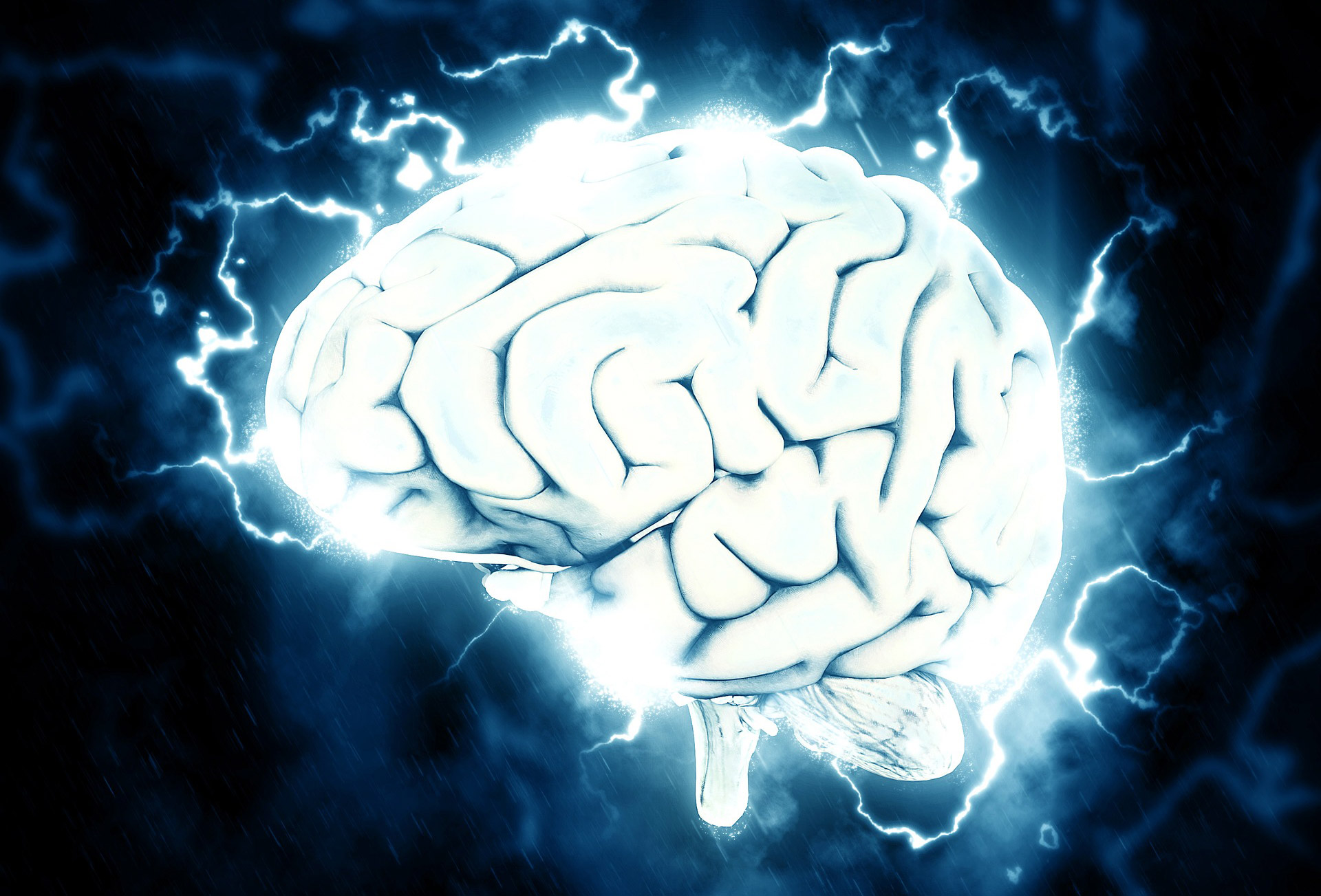 Let’s take a closer look at some of the most common symptoms of traumatic brain injury, many of which may make it impossible for you to work. Any of these symptoms can subside within days of cerebral trauma, or persist for years, even permanently. Symptoms that hang around permanently are referred to as persistent post-concussive symptoms. If you suffer a variety of them all at the same time, that’s a condition known as post-concussive syndrome.
Let’s take a closer look at some of the most common symptoms of traumatic brain injury, many of which may make it impossible for you to work. Any of these symptoms can subside within days of cerebral trauma, or persist for years, even permanently. Symptoms that hang around permanently are referred to as persistent post-concussive symptoms. If you suffer a variety of them all at the same time, that’s a condition known as post-concussive syndrome.
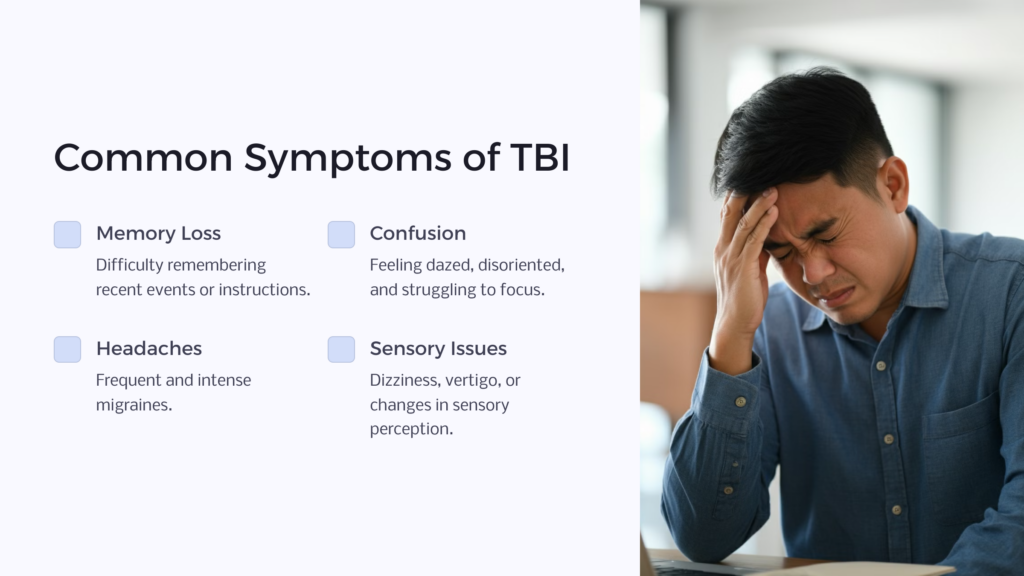
1. Memory Loss
It is not uncommon for those who have suffered a traumatic brain injury to experience issues with their memory, especially their short-term memory. Many people who suffer from TBI may be unable to remember their accident or the cause of their injury at all. They may also struggle to remember details of assignments or instructions, which can dramatically affect their capacity for day-to-day work.
2. Confusion
A traumatic brain injury can leave a victim feeling dazed and disoriented, often easily confused. People who suffer this kind of cerebral trauma often report cognitive deficits over the long term. Victims are unable to focus or concentrate, and they may take longer to process their thoughts – all of which are important in just about any line of work.
3. Migraine Headache
Frequent and intense migraine headaches are fairly common after a traumatic brain injury. They may only last a few weeks or result in a permanent, recurring condition.
4. Dizziness or Other Sensory Issues
Someone who suffers a traumatic brain injury may often experience vertigo, general dizziness, or difficulty with balance. These symptoms can occur immediately following the impact or appear several days or weeks later. This symptom also may be accompanied by other sensory issues like loss of taste or smell, ringing in the ears, or a bad taste in the mouth.
Symptoms of this nature are generally associated with trauma to the base of the skull, which can cause damage to the cranial nerves. People suffering from this type of trauma may experience blurred vision, sensitivity to light, or noise sensitivity. Hand-eye coordination or other motor function may also be impaired. Depending on their severity, any of these symptoms may fade soon after the initial impact, while others may linger, even permanently.
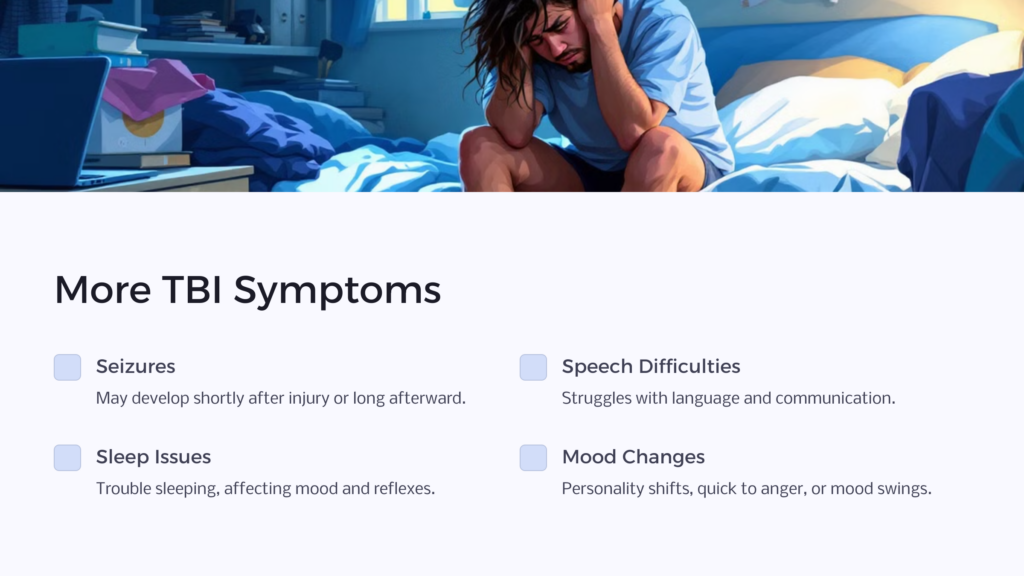
5. Seizures
Some people who suffer traumatic brain injuries often begin to develop seizures. Sometimes, this occurs shortly after the initial trauma, though seizures may not begin until long afterward. When seizures like this are recurrent and long-term, the condition is known as post-traumatic epilepsy.
6. Speech Difficulties
Many times, language and general communication can be a struggle for people who have suffered a TBI. This can result in tremendous frustration, misunderstandings, and even conflict with family members and colleagues. In addition to having trouble expressing themselves, people with traumatic brain injuries may also struggle to follow the thread of a conversation or to read nonverbal cues.
7. Trouble Sleeping
Those who suffer traumatic brain injuries often have trouble sleeping, which can dramatically impair everything from their mood to their reflexes during work hours. A lack of sleep makes it very difficult to effectively complete tasks.
8. Mood Changes or Extreme Mood Swings
Traumatic brain injuries can lead to changes in personality or mood, often resulting in people being quick to anger and feeling extraordinarily agitated or combative at a moment’s notice. Wild and frequent mood swings can make it impossible to navigate the complex relationships of the workplace. Many times, those who suffer from traumatic brain injuries can experience depression, anxiety, or other emotional changes as well.
Symptoms of Frontal Lobe Damage
Frontal lobe damage refers to impairment or injury to the frontal lobes of the brain, which are responsible for a wide range of cognitive, emotional, and behavioral functions. The symptoms of frontal lobe damage can vary depending on the extent and location of the injury. One of the most recognizable symptoms of frontal lobe damage is a decline in executive functions. These functions include problem-solving, decision-making, planning, and organizing tasks. Patients may experience difficulties in initiating and completing tasks, exhibit poor judgment, and struggle to adapt to changes in their environment.
In cases of left frontal lobe damage, language-related symptoms may be prominent. This can result in difficulty in expressing oneself verbally, finding the right words, and comprehending language. Additionally, you may become more withdrawn and experience mood changes, such as depression or anxiety.
Frontotemporal dementia (FTD) is a specific condition involving damage to the brain’s frontal and temporal lobes. It often leads to personality changes, social withdrawal, and language difficulties. In contrast, occipital lobe damage is associated with visual impairments, such as vision loss or disturbances. On the other hand, parietal lobe damage can contribute to problems with sensory perception, spatial awareness, and body image. People with parietal lobe damage may struggle to recognize objects or their body parts.
Various factors, including traumatic brain injuries, strokes, tumors, and infections can cause frontal lobe damage. Acquired brain injuries from accidents or falls can also damage frontal lobe. Understanding the symptoms of frontal lobe damage is crucial for early diagnosis and intervention. Proper assessment and treatment can help manage the effects of the injury and improve your quality of life.
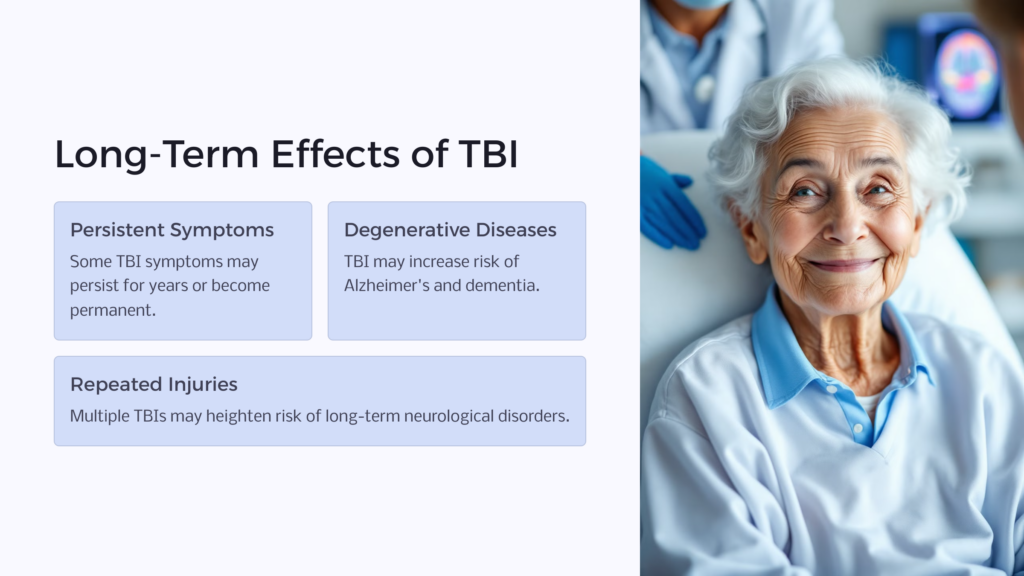
Dementia and Alzheimer’s Disease
There is some evidence that certain types of traumatic brain injuries may increase a person’s likelihood of developing Alzheimer’s Disease, dementia, or degenerative brain diseases. Studies indicate that adults with a history of moderate traumatic brain injury were 2.3 times more likely to develop Alzheimer’s Disease than those with no history of head injury.
If the brain injury is severe, victims were shown to be 4.5 times more likely to develop Alzheimer’s Disease. The most recent research available shows a positive correlation between traumatic brain injury and the protein abnormalities linked to Alzheimer’s Disease.
An individual’s risk for developing these kinds of diseases after a traumatic brain injury is difficult to predict, and the research into the relationship between brain injury and degenerative brain diseases is still ongoing. Not every patient who suffers a brain injury develops dementia or another neurological disorder. While there is no evidence that a single traumatic brain injury can lead to degenerative brain diseases, there is an indication that repeated brain injuries, like those commonly suffered when playing high-contact sports, may increase a person’s chances of developing a degenerative brain disease later in life.
Which TBI symptoms are most likely to get a high VA disability rating?
The most significant TBI symptoms are cognitive impairments, physical limitations, and psychological conditions.
For cognitive impairment, TBI can affect memory, attention, concentration, and problem-solving abilities, making it difficult to perform daily tasks and maintain employment. If these cognitive impairments are severe and persistent, the VA is likely to assign a higher disability rating.
Physical impairments such as paralysis, loss of coordination, and motor control issues can significantly limit a veteran’s ability to perform physical activities, including work.
Also, psychological symptoms associated with TBI can influence the disability rating. Depression, anxiety, PTSD, and other mood disorders often coexist with TBI.
To prove any of these symptoms, provide comprehensive medical documentation, including evidence of diagnosis, treatment, and functional impairment. Remember, the VA considers the overall impact of symptoms on the individual’s daily life when determining the disability rating. The more difficult and pervasive the symptoms are, the better the likelihood of receiving a higher disability rating.
Disability Benefits for Traumatic Brain Injury
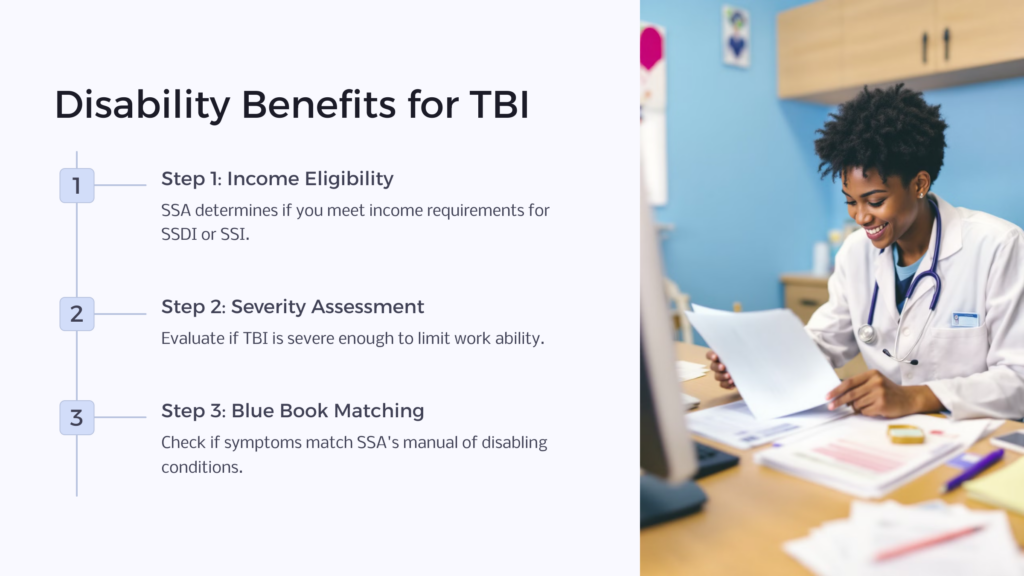
In the event of a traumatic brain injury, the patient can suffer cognitive impairment, which is often the most long-lasting and debilitating of all TBI symptoms. Many times, cognitive impairment makes holding down a job impossible. In these cases, the SSA may approve your application for disability compensation. It’s always a good idea to talk to a knowledgeable and qualified disability attorney. An experienced lawyer can evaluate the strength of your claim and guide you in the process of getting the disability compensation you are eligible to receive.
 Benefits.com Advisors
Benefits.com Advisors
With expertise spanning local, state, and federal benefit programs, our team is dedicated to guiding individuals towards the perfect program tailored to their unique circumstances.
Rise to the top with Peak Benefits!
Join our Peak Benefits Newsletter for the latest news, resources, and offers on all things government benefits.



















